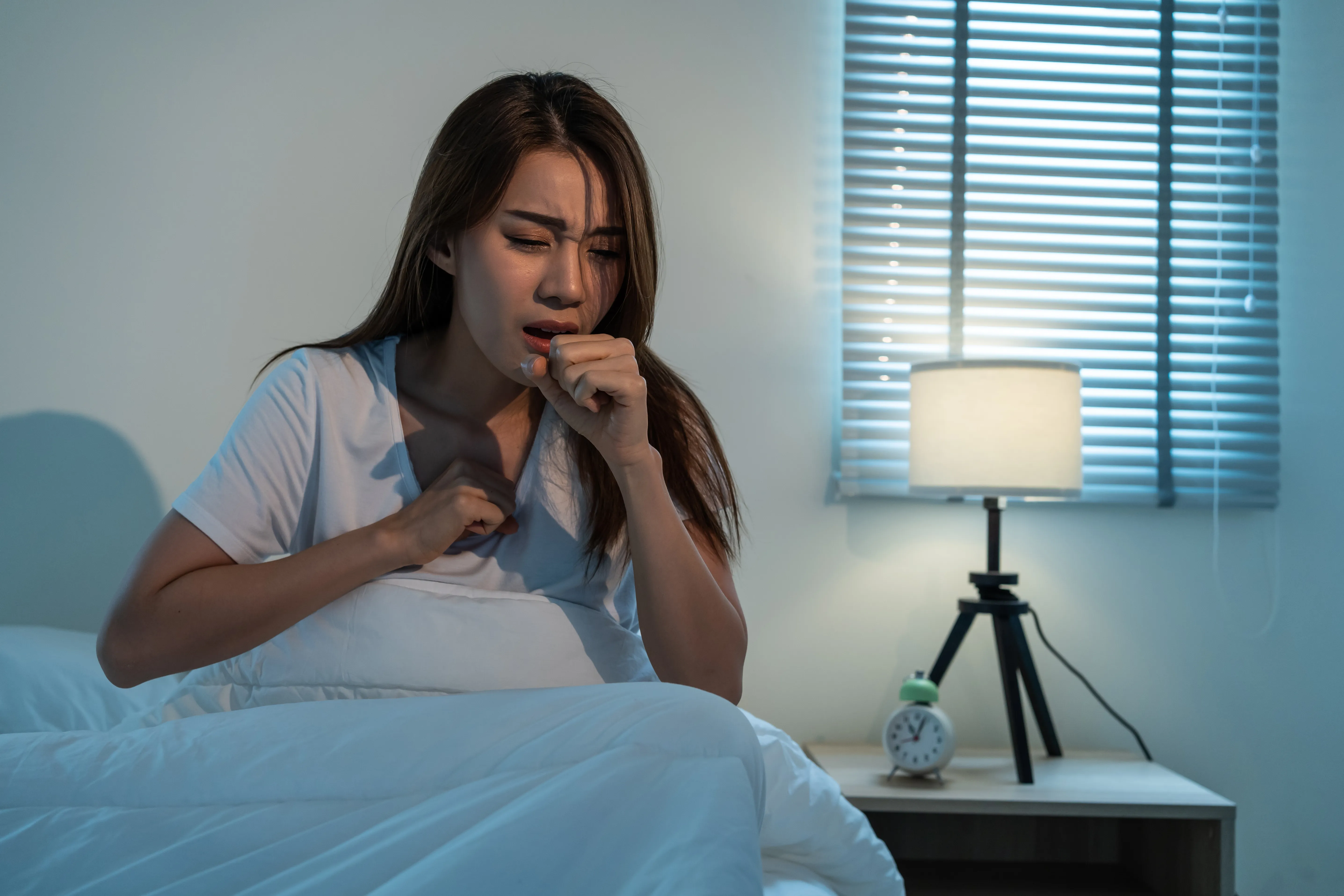Sleep is a vital aspect of any healthy lifestyle. Getting the recommended daily amount of sleep is essential for better physical and mental health.
However, many people experience waking up with a dry throat, which can disrupt their sleep cycle and cause them discomfort.
In this article, we will discuss the causes of this experience, its symptoms, and remedies for immediate relief.
What Causes Dry Throat at Night?

Waking up with a dry throat can be attributed to many factors, such as environmental factors, lifestyle factors, sleep habits, or medical conditions.
Understanding these causes is essential for finding effective solutions and ensuring a more restful night's sleep.
Environmental Factors
Waking up with a dry throat can often be related to various environmental factors that affect the air quality and humidity levels in your sleeping area.
- Low Humidity Levels: When humidity is low, particularly during the winter months or in arid climates, the moisture in the air decreases, leading to dry mucous membranes. This lack of moisture can result in discomfort upon waking, as the throat becomes parched overnight.
- Exposure to Dry Air While Sleeping: Many individuals use heating systems or air conditioning that further reduce indoor humidity levels. This dry air can irritate the throat and nasal passages, making it difficult to maintain adequate hydration during sleep. To mitigate these effects, it is beneficial to use a humidifier in the bedroom, ensuring a more comfortable sleeping environment.
Lifestyle Factors
Many lifestyle choices can cause waking up with a dry throat, and recognizing these lifestyle factors is essential for addressing and alleviating the issue of waking up with a dry throat.
- Inadequate Water Intake: Insufficient hydration throughout the day can lead to dryness during the night, as the body loses fluids while sleeping.
- Excessive Caffeine or Alcohol Consumption Before Bed: Habits such as excessive caffeine or alcohol consumption can exacerbate dehydration, further contributing to a dry throat upon waking.
- Smoking or Exposure to Secondhand Smoke: Smoking irritates the mucous membranes of the throat, leading to inflammation and dryness. Additionally, individuals exposed to secondhand smoke may experience similar effects, as the toxins can compromise respiratory health.
Sleep Habits
Waking up with a dry throat can often be attributed to various sleep habits that disrupt the natural moisture retention of the mouth and throat.
- Mouth Breathing: Mouth breathing can lead to increased airflow over the throat and oral cavity, causing them to dry out overnight. Mouth breathing can result from nasal congestion, allergies, or even simply a habitual tendency that develops over time.
- Sleeping Position: Certain positions, particularly sleeping on one's back, may encourage mouth breathing or lead to an open mouth posture, exacerbating dryness in the throat. Individuals who frequently experience a dry throat upon waking should consider their sleeping positions and make adjustments accordingly, potentially opting for side sleeping as a more beneficial alternative.
- Poor Sleep Hygiene: Poor sleep hygiene encompasses a range of factors, including sleeping in an environment that is too dry, using irritants such as tobacco or alcohol before bed, or failing to maintain a clean sleeping space. These elements can lead to dehydration during the night, resulting in a dry throat upon waking.
- Inconsistent Sleep Schedules: Inconsistent sleep schedules can exacerbate these issues; irregular sleeping patterns disrupt the body's natural circadian rhythm, potentially leading to insufficient restorative sleep. This disruption may cause the body to produce less saliva, contributing to the feeling of dryness in the throat.
Medical Conditions
Waking up with a dry throat can be a perplexing experience, often attributed to various medical conditions.
Understanding these underlying medical conditions is essential for effective treatment and improving overall sleep quality.
- Allergies: One significant cause is allergies, which can lead to nasal congestion and mouth breathing during sleep. When the nasal passages are obstructed due to allergens such as pollen, dust mites, or pet dander, individuals may unconsciously breathe through their mouths. This can result in dryness of the throat upon waking, along with other symptoms like sneezing or itchy eyes. Know more about Bedding Allergy
- Sleep Apnea: This serious sleep disorder causes interruptions in breathing during sleep, often resulting in fragmented sleep and mouth breathing. Individuals with sleep apnea may experience a dry throat upon waking due to the prolonged periods of air passing through the mouth rather than the nose.
- Acid Reflux (GERD): This condition occurs when stomach acid flows back into the esophagus, which can irritate the throat and lead to a sensation of dryness or discomfort. Individuals suffering from GERD often experience symptoms that worsen when lying down, making nighttime particularly challenging.
- Sinusitis or Nasal Congestion: Sinusitis often leads to inflammation and blockage of the nasal passages, causing individuals to breathe through their mouths during sleep. This mouth breathing can exacerbate dehydration in the throat, resulting in discomfort upon waking. Additionally, nasal congestion can limit airflow through the nose, further increasing reliance on oral breathing.
- Tonsillitis or Pharyngitis: These conditions are characterized by inflammation of the tonsils or pharynx, leading to discomfort and dryness. When these areas become inflamed, they can hinder proper salivary function, resulting in a parched sensation upon waking.
Symptoms of Morning Dry Throat

Morning dry throat is a common condition that can manifest with several noticeable symptoms. It is important to address these symptoms, as they can significantly impact one's quality of life and overall well-being.
Persistent Dryness or Soreness
Morning dry throat is often characterized by persistent dryness or soreness upon waking. This discomfort can lead to difficulty swallowing, a constant need to clear the throat, or even mild pain.
Difficulty Swallowing
This discomfort can arise from the lack of moisture in the throat, making it feel scratchy or tight. As a result, those affected might find it challenging to consume food or beverages comfortably until they have adequately hydrated.
Hoarseness
One of the most prevalent signs is hoarseness, which may occur due to the throat's mucous membranes becoming dry overnight. This dryness can irritate the vocal cords, leading to a raspy or strained voice upon waking.
Bad Breath
Individuals suffering from this condition may also experience bad breath, which can result from reduced saliva production during sleep.
Saliva plays a crucial role in washing away food particles and bacteria; thus, its decreased presence can lead to an accumulation of odor-causing agents in the mouth.
How a Dry Throat Can Affect Your Sleep Quality
A dry throat can considerably affect sleep quality, leading to a cascade of negative effects on overall well-being.
By understanding how hydration plays a crucial role in facilitating restful sleep and recognizing the contributing factors to dryness, individuals can take proactive steps to safeguard their sleep health.
Sleep Disruption
During sleep, our body goes through various restorative processes, and adequate hydration is crucial for these functions. When the throat is dry, it can disrupt the natural flow of air during breathing, leading to increased irritation and discomfort.
This discomfort makes it difficult for individuals to fall asleep or maintain deep sleep stages, which are essential for physical and mental recovery. The presence of a dry throat often results in frequent awakenings throughout the night, which can induce feelings of fatigue and irritability the following day.
Exacerbate Sleep Disorders
A dry throat can exacerbate common sleep disorders such as snoring and sleep apnea. When the throat is dry, the tissues become less flexible and more susceptible to collapse during sleep, leading to airway obstruction.
This obstruction not only disrupts sleep but can also lower blood oxygen levels, placing additional strain on the cardiovascular system.
Consequently, individuals suffering from a dry throat may experience fragmented sleep cycles characterized by non-restorative rest and sleep debt symptoms, leaving them feeling lethargic and unrefreshed in the morning.
Prevention and Remedies
Waking up with a dry throat can be uncomfortable and disruptive to your morning routine. Fortunately, there are many dry throat remedies to alleviate this issue and improve your overall sleep quality, and incorporating these strategies can lead to more restful nights and rejuvenated mornings.
Stay Hydrated
Drinking adequate amounts of water helps maintain overall health and stops throat dryness at night.
Additionally, consider consuming herbal teas or broths before bedtime, as these can provide extra hydration and soothe your throat.
Use a Humidifier
A humidifier adds moisture to the air, which can help keep your throat hydrated while you sleep. It is advisable to maintain the device and clean it regularly to prevent any growth of mold or bacteria, which could exacerbate throat issues.
Manage Nasal Congestion
By ensuring that your nasal passages remain clear, you can breathe more easily through your nose during the night, reducing the likelihood of mouth breathing, which contributes to dryness.
Address Acid Reflux
Acid reflux can irritate the throat and lead to dryness or discomfort. To manage this, consider avoiding heavy meals before bedtime and elevating your head while you sleep.
Such adjustments can help minimize reflux incidents and contribute to a more restful night’s sleep.
Using Throat Lozenges or Sprays
Using throat lozenges or sprays can provide immediate relief from waking up with a dry throat.
These remedies help soothe irritation and moisturize the throat, making them effective solutions for alleviating dryness and enhancing overall comfort.
Gargling with Salt Water or Baking Soda Solution
Gargling with salt water or baking soda solution can provide soothing relief for an irritated throat, helping to alleviate discomfort.
This simple remedy not only hydrates the throat but also promotes healing by reducing inflammation and flushing out irritants.
Manage Allergies
To prevent waking up with a dry throat, it is essential to manage allergies effectively, as allergens can lead to nasal congestion and compel individuals to breathe through their mouths at night.
Keeping the bedroom environment clean and using air purifiers can further alleviate symptoms.
Avoid Smoking and Alcohol
Avoiding smoking and alcohol is crucial, as both substances can irritate the throat and exacerbate dryness.
Smoking introduces harmful toxins that can damage mucous membranes, while alcohol has a dehydrating effect on the body.
When to See a Doctor

Waking up with a dry throat can be a common occurrence, often linked to environmental factors or lifestyle choices.
However, it is important to understand when it may be necessary to consult a healthcare professional regarding this condition.
By addressing these symptoms early, you can ensure proper diagnosis and treatment, promoting better overall health and well-being.
If Symptoms Persist for More Than a Week
If symptoms persist for more than a week, it could indicate an underlying condition that requires attention.
Persistent dryness may lead to discomfort and potential complications, making it crucial to seek medical advice in such cases.
Severe Pain or Difficulty Swallowing
If you experience severe pain or difficulty swallowing alongside a dry throat, it is advisable to see a doctor promptly.
These symptoms could indicate an underlying condition, such as an infection or inflammation, that may require treatment.
Signs of Infection
If you notice swollen lymph nodes or a persistent cough, it is advisable to seek medical attention promptly to rule out any infections that may require treatment.
Suspected Sleep Apnea or GERD
If this symptom persists and is accompanied by snoring or gasping during sleep, it could indicate suspected sleep apnea. This condition can disrupt sleep quality and lead to more severe health problems if left untreated.
Alternatively, waking up with a dry throat may also suggest gastroesophageal reflux disease (GERD), where stomach acid irritates the throat during sleep.
FAQs
How can I tell if my dry throat is due to allergies?
Allergies often manifest with additional symptoms such as nasal congestion, sneezing, or itchy eyes. If these symptoms coincide with exposure to allergens like pollen, pet dander, or dust mites, it is likely that the dry throat is allergy-related.
What role does air quality play in throat dryness?
Air quality significantly influences throat dryness, as pollutants and allergens can irritate the respiratory tract; it can lead to inflammation and discomfort in the throat.
Can acid reflux cause a dry throat in the morning?
Acid reflux can indeed cause a dry throat in the morning. This condition occurs when stomach acid flows back into the esophagus, often reaching the throat.
Could my sleeping position be contributing to a dry throat?
Yes, your sleeping position could indeed be contributing to a dry throat. When individuals sleep on their backs, the tongue and soft tissues can collapse into the throat, potentially obstructing airflow and causing dryness.
Conclusion
Addressing the discomfort of waking up with a dry throat involves recognizing the contributing factors and implementing appropriate solutions.
Staying hydrated, utilizing humidifiers, and addressing potential allergens can significantly improve your morning experience. By taking proactive measures, you can ensure a more restful night's sleep and awaken feeling refreshed.
Jessica H.
Jessica is a reviewer, writer, and sleep enthusiast at Sleepiverse. Jessica graduated with her master's degree in Nursing research and education. She is a registered nurse and currently works in the Intensive Care Unit. Since becoming a nurse, Jessica has worked the night shift, which means a disrupted sleep schedule. Knowing she needed to function at her best while caring for patients at night, she spent a lot of time researching how to sleep well with a difficult schedule.


